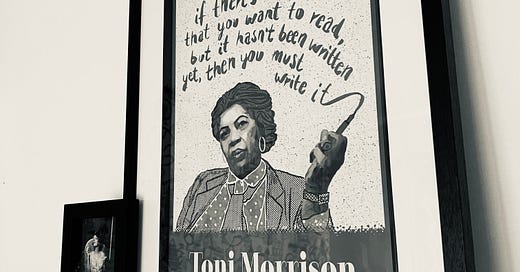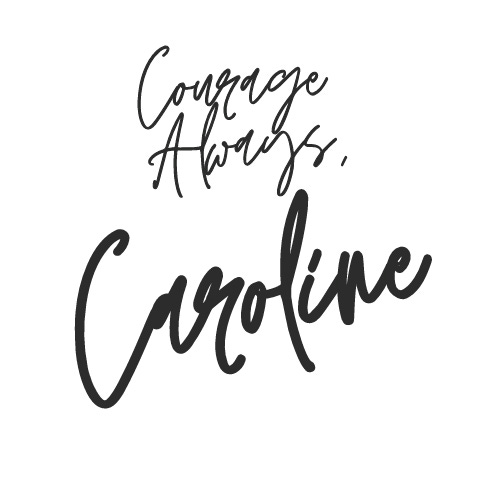Thinking Outloud #11 A Braver Future Begins With Us
Democratising courage is more powerful when we do it together. Your voice is part of the story, if you want it to be.
Hello to you dear reader,
Today’s piece is part reflection, part thinking out loud, and part request for your help and opinion.
Which I really hope you’ll offer, whether in a direct message or in the comments. Would you do that for me?
It’s about my writing. The who, what, why, and how of it.
As some of you will know, this Quiet Courage Substack started as a quiet little corner of the t’interweb, where I could practice and improve the craft of writing and share my thoughts and research on courage. I’ve experimented with different styles, I can see some progress, and I’ve learned a lot.
So yes, in one sense I’m writing for myself, but in another, I’m writing for you. That’s why I’ve been trying to make my pieces shorter, more practical, more useful. Whether I’m succeeding, I can only guess through subscribers, unsubscribes, open rates, and the emboldening and inspiring messages I get from some of you.
There’s a difference between writing for attention and writing to genuinely connect. I hope I’m doing the latter. But truthfully, I don’t always know what’s going on in your head.
That’s why dialogue matters so much.
Connection sharpens ideas. It stretches thinking. It helps us see ourselves more clearly. We are capable of being and doing so much more when we’re connected to others, and for me, this space has become a real example of that. Your feedback, reflections, and presence shape how I write, what I explore, and how I grow.
Connection is one of the 4 foundational pillars of a building Be Braver mindset. How we connect to the self, each other, our organisations and the world around us. The resources that we have access to, that can help shape and determine the future we are moving towards.
So let me tell you, as openly as I can, why I’m really writing here, and then I’d love to hear your thoughts and responses.
There are three reasons:
I want to write a book.
I need to pay my mortgage.
I want to be the patient zero of courage - democratising it in all the spaces where it’s been invisible.
By that, I mean bringing courage out of the boardroom, beyond self-help books, and into everyday conversations, workspaces, schools, friendships, families. Making it a skill, a mindset, a shared language. Not something reserved for a few, but something everyone can access, apply, and live by.
The book won’t pay the mortgage. I know that.
I have a poster in my office of Toni Morrison smoking a cigarette. It says,
“If there is a book you want to read that hasn’t been written yet, then you must write it.”
You probably know how strongly I feel about courage. I’ve spent the last ten years teaching it, practising it, researching it. I thought I was on one-woman mission to democratise it.
Through connections I have started to find a supportive community of mission-driven peers. I’ve had the courage to reach out and connect with women like Cynthia Pury,
, Kirsi Soulami who I’m so grateful to now be collaborating with.My work has changed lives, careers, teams, businesses. Writing a book is my way of sharing that work more widely. A gift. A legacy. A way to put ideas into the hands of people who’ve asked me, “Do you have a book?”, people I know would benefit. I believe it would make a difference.
But that kind of writing doesn’t guarantee an income. So I also write here to connect with people who might want to work with me, individuals and organisations who want to build courage and leadership in their teams, their cultures, or themselves.
And yes, those are two different audiences, with different needs. I’m figuring it out as I go. My writing is evolving. So is this Substack. So is my business. And so is the book.
For most of last year, I thought I was writing a traditional non-fiction book, somewhere between personal development, leadership, and psychology. I tried to translate the Be Braver mindset and programme into something practical and valuable: a book for anyone who couldn’t work with me directly, and a takeaway for those who could. A product. A tool. A door-opener.
I’ve seen many consultants go that route. The book doesn’t make money, but it builds credibility. It opens doors. It says, “I know my stuff.”
But then something shifted.
As I kept writing, and reading, especially here in substack I realised I might want to tell the story differently. More creatively. The idea came late last year: what if I wove the research, insights, and tools into a narrative? Told through characters and dialogue? Still full of wisdom, but delivered like a story. Philosophical fiction, maybe.
It’s a stretch. I’m not a writer by training. But I’ve started. I’ve shared early chapters with a few people. The feedback has been nothing but encouraging. It’s almost as if courage inspires courage!
Still, I’ve stalled. Because the truth is, it’s a monumental effort. And right now, I need the time I invest in anything to help secure financial stability for me and my son. I don’t have the luxury of writing purely for the joy of it, it simply isn’t safe for me to take that risk right now. It would be reckless, not courageous.
I’m also collaborating with a couple of academics on another book about courage. We’re still in the early stages, so I won’t go into detail just yet, we need to figure a few things out before we share more publicly. But I wanted to mention it, just in case it affects the advice you might give about my own book direction.
And finally, let me tell you this.
This whole Quiet Courage Substack, this writing journey, is you watching courage in action. You’re witnessing my own journey of bravery in this one aspect of my life. I hope you see now the important role you play in it. You are the inspiration behind it and fuel that keeps its going. It’s collective courage.
The exposure I felt when I first shared my words here? You might not believe it if you’ve only just started following. I always say courage shows up in unexpected ways, and the most surprising part of this has been the new relationships it’s brought. New people. Shared ideas. Collaboration. Community.
And what makes life more meaningful than the connection we have with each other?
I don’t know how to find everyone here but to name a few a that have brought joy to my writing journey I’d like to thank:
, , , , , ,I know not everyone feels comfortable being vulnerable about things like courage or bravery on public platforms. And that’s okay. My DMs are always open, and only I can see them. If there’s something you’d rather say privately, I welcome it.
So I’d really love to know:
What do you get from reading my work here?
Which version of the book would you rather read - practical non-fiction, or philosophical fiction?
Are you more interested in courage in the context of your career, or your life?
Any other pointers, comments or reflections you fancy sharing?
Thank you, for reading, for sticking around, and for being part of this.
Democratising courage is a more powerful endeavour when we do it collectively. If you’d like to be part of the story , and part of creating a braver future, your words are a small but oh so powerful first step.
I work with organisations and teams, mostly new and emerging leaders, to help them understand what courage looks like in practice. My approach blends research, psychology, and lived experience into practical frameworks leaders can use in moments that matter: high-stakes conversations, major transitions, values-based decisions, and deep uncertainty.
I also work privately with individuals and love collaborating with others who are passionate about reshaping leadership, equity, and well-being. I’m especially interested in funding and partnerships that support sustainable, long-term impact for young people and marginalised communities, those who often need courage the most, but are resourced the least.
If this piece moved you, resonated, feels relevant, or made you think differently about courage, share it. You never know who might need it today.
When you pass it on, you’re not just boosting my work - you’re creating ripples.
You become part of a quiet but powerful shift in how we understand bravery, leadership, and the future we want to build.
And I’d love to hear from you.
What does courage look like for you right now?
What would being braver mean in your world?













Hi Caroline - Great questions. I dip into your work occasionally. I have been a free subscriber for a few years. I initially came across you IRL at a Women in Data conference in London.
Answers to your questions:
1) I find the content that I can access engaging and thought provoking and I like reading it. You know your stuff and write engagingly like a human.
2) I am not actually sure - I suspect I'd pick up non fiction more readily. It would feel more sensible, practical and worthy. And I am consciously trying to go back to reading more fiction - just because life it makes life richer and more beautiful.
3) Your question implies work and life are separate. I thought they were too. And in practical terms we are inclined to invest more in learning for career development etc. I am pleased to say that I have detoxed completely from that way of thinking as I work on my next career pivot which will, in reality, be a career and life pivot. However as you want people to part with money you are probably best off working on the "work" angle. I sometimes think women aren't great at spending money on themselves if it risks making them to big and bold for the lives they have because we're taught and slightly programmed to keep everyone happy.
More generally my reflections are:
1) as you have some chapters (well done!), why not turn them into an actual non fiction pitch and see what the Universe says? I am part of a writing circle run by Beth Kempton https://bethkempton.substack.com/ called SoulCircle. Beth is a non fiction author and is running a free class in the w/c 12 May on how to get a non fiction book deal. https://dowhatyouloveforlife.com/course/how-to-get-a-book-deal-may-2025/. I did Beth's free class on getting up and running with substack earlier this year - fabulous, engaging, practical content. It will cost you £0 to dip into next weeks material. (Full disclaimer: I am part of her community, not on commission and am not writing a book, I am currently dabbling on substack exploring my many ideas.)
2) You are asking questions about what we want (including people who, let's face it, haven't coughed up a subscription). What I am curious about is your vision or theory of change....
- do you want women across the UK/the world to be discussion your book in book groups - if so go fiction and with that intention that that is a route for influencing.
- or is it something more corporatey/worky.
Ultimately what do you want to see women doing that we aren't doing where you think - yes! That's braver. That's what I really want to know.
3) Finally - next time you go to the Women in Data conference can you please ask them to give you the big plenary room. I still haven't managed to get into your sessions and frankly all ~2000 attendees need to hear about your work. :-)